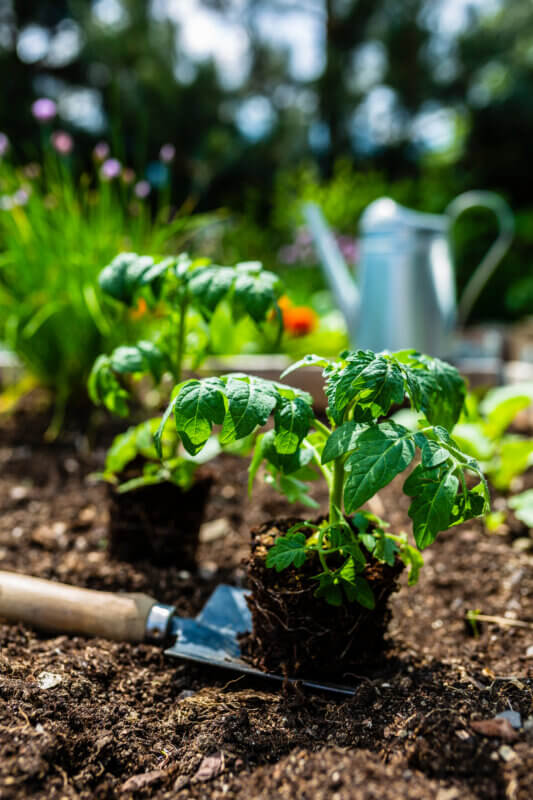A good reason for gardening: Gardening is good for us
Whether you are a “seasoned” (pun intended) gardener with many years of experience and an ample area where you grow lots of vegetables or a food gardener on a modest scale, you recognize the appeal of growing something you can eat. That appeal is hard to resist, even though growing food takes time and physical work.
Planting a garden is a commitment to staying present and attentive to its needs for weeks or months so it can thrive and produce something for you to harvest. As everyone who has tried knows, that can be a hard commitment to keep.
So why do we garden? Sometimes it’s for economic reasons. When we can invest our own time and energy to produce some of our food, we don’t have to lay out as much cash to buy food from other sources. Even a few tomato and bean plants can stretch a tight food budget, not to mention lettuce and other greens, potatoes or squash.

Many gardeners will say they love the experience of contact with soil, seeds and growing plants. It connects us with the countless generations of humans whose survival from the beginning has depended on a direct relationship with plants (and the other animals which depend on plants). It’s uniquely satisfying to eat what you have helped produce, along with it being delicious and nutritious.
Nowadays, most of us in the U.S. do not need to feed ourselves through our own efforts. We have the option of paying other people to plant, tend, harvest, pack and transport fresh, preserved and processed food from wherever they are to wherever we are. Profit incentive created that system and keeps it going. Industrialized agriculture, food processing and associated agri-business is a huge complex, unsustainably based on minimum wage or below for most of the people doing the physical work and addictive profits for investors.
It is, however, convenient to just go to a store and buy what we want. Around here, we’ve grown accustomed to shelves generally being well stocked all the time, no matter the time of year. There is not much to remind us of the time and care and energy (both human and mechanical) it took to put that eggplant on the shelf in Hannaford’s or those navel oranges in Price Chopper. We’re glad they’re there. And when our food budget allows, we buy them.
So given how available food is to buy, why does food gardening remain solidly popular, even here in the Northeast where the growing season is short? Research shows that people find having tangible experiences with soil, seeds and growing plants grounds and calms them as they engage with natural cycles and life forces. Even having a small part in the miracle of a seed becoming a plant which bears fruit and more seeds inspires wonder and gratitude. The physical movement and mental focus of garden work relieves stress. And certainly, opening one’s senses to observe and pay attention to details offers a welcome respite from dwelling on personal worries. People who garden, especially food garden, just feel better.
Not only that, but apparently we tend to live longer, healthier and happier. In January, Vermont Public featured a story named “Seven habits to live a healthier life, inspired by the world’s longest-lived communities.” What we eat, how we move, how much we sleep and how we manage stress and social connection really make a difference.
Many people who live in the world’s blue zones, places where people live longer like Sardinia and Okinawa, are gardeners. This means eating plenty of vegetables along with regular walking, bending, reaching, balancing, lifting and gardening’s restorative benefits of stress relief. The National Center for Chronic Disease Prevention and Health Promotion includes gardening in their recommendations for reducing risk of many chronic diseases shortening life-expectancy in the U.S. today.
I guess it’s no wonder we keep gardening.
If you are planning a vegetable garden this year, remember that our library has a seed library program which offers free packets of local heritage varieties of beans, peas, tomatoes, salad greens, herbs and edible flowers, along with support for growing them and saving seeds for yourself and to share with others. See charlotteseedlibrary.org for the catalog and other details.
Another way to get ready for the growing season is to come to the Community Seed Swap sponsored by the seed library and the Charlotte Grange, 1-3 p.m., Sunday, April 7, at the Grange Hall (2858 Spear Street in East Charlotte Village). Details on the website. Come with or without seeds to share.
Happy gardening!(Linda Hamilton is a member of Charlotte Grange and co-coordinator of the seed library at the Charlotte Library.)

